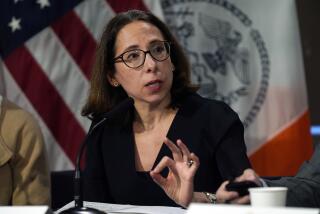SEC lawyer raised Madoff concerns but was rebuffed
- Share via
WASHINGTON WASHINGTON — An investigator at the Securities and Exchange Commission warned superiors as far back as 2004 about irregularities at Bernard L. Madoff’s financial management firm, but she was told to focus on an unrelated matter, according to agency documents and sources familiar with the investigation.
Genevievette Walker-Lightfoot, a lawyer in the SEC’s Office of Compliance Inspections and Examinations, sent e-mails to a supervisor, saying information provided by Madoff during her review didn’t add up and suggesting a set of questions to ask his firm, documents show.
Several of those questions directly challenged Madoff activities that much later turned out to be elements of his massive fraud.
But with the agency under pressure to look for wrongdoing in the mutual fund industry, she wasn’t able to continue pursuing Madoff, according to documents and two people familiar with the investigation, and her team soon concluded its work on the probe.
Walker-Lightfoot’s supervisors on the case were Mark Donohue, then a branch chief in her department, and his boss, Eric Swanson, an assistant director of the department, said two people familiar with the investigation. Swanson later married Madoff’s niece, and their relationship is now under review by the agency’s inspector general, who is examining the SEC’s handling of the Madoff case.
Madoff confessed in December to running a multibillion-dollar Ponzi scheme. The fallen financier was sentenced Monday to 150 years in prison. Authorities are continuing to investigate other people and firms that might have abetted the fraud.
The SEC’s inability to detect Madoff’s fraud was a high-profile embarrassment for the agency, which was already under scrutiny for the collapse of investment banks under its watch, helping fuel the financial crisis.
SEC Chairwoman Mary L. Schapiro, who took over shortly after the Madoff case came to light, has acknowledged that the agency’s performance was a failure, saying the SEC needed to improve enforcement and its surveillance of financial markets.
At least five times over nearly 20 years, the SEC investigated Madoff’s business but never discovered the tremendous fraud. In 2007, for instance, the agency reviewed his activities after warnings from a onetime rival, Harry Markopolos, that Madoff was probably running a Ponzi scheme.
Three years before, in early 2004, Walker-Lightfoot was assigned to examine Madoff’s relationship with various hedge funds. The SEC suspected that Madoff may have been allowing the funds to trade ahead of his own trades, which would give them an unfair advantage.
The agency ordered Madoff to turn over reams of information -- accounting statements, trade confirmations and other documents -- and told him to detail his strategy, called “split-strike conversion.”
Madoff told the SEC that he used sophisticated trading practices to buy and sell stocks, employing stock options as hedges to limit losses. He told investors he never lost money.
More to Read
Inside the business of entertainment
The Wide Shot brings you news, analysis and insights on everything from streaming wars to production — and what it all means for the future.
You may occasionally receive promotional content from the Los Angeles Times.










